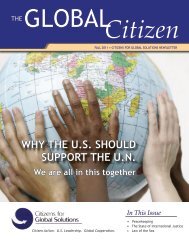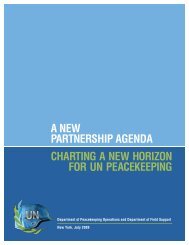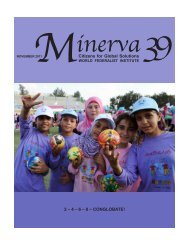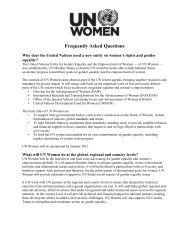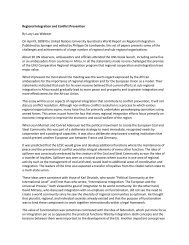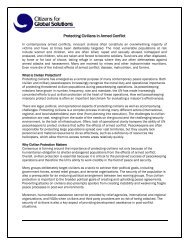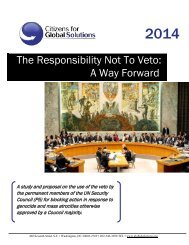Minerva, Spring 2008 (Volume 32) - Citizens for Global Solutions
Minerva, Spring 2008 (Volume 32) - Citizens for Global Solutions
Minerva, Spring 2008 (Volume 32) - Citizens for Global Solutions
Create successful ePaper yourself
Turn your PDF publications into a flip-book with our unique Google optimized e-Paper software.
The global water crisis is<br />
evident. We need a global<br />
solution in <strong>for</strong>m of a United<br />
Nations covenant on water.<br />
A UN Covenant on the Right to Water:<br />
An Idea Whose Time Has Come<br />
Maude Barlow<br />
Maude Barlow is Chair of the Council<br />
of Canadians and author of Blue Covenant,<br />
The <strong>Global</strong> Water Crisis and the<br />
Coming Battle <strong>for</strong> the Right to Water.<br />
She posted this essay on 18 February<br />
<strong>2008</strong> on the website of The Movement<br />
Vision Lab, which “brings together<br />
grassroots organizers and social justice<br />
advocates to share and debate long-term,<br />
visionary ideas <strong>for</strong> the future”.<br />
Its reprinting is authorized under a<br />
Creative Commons license by the Center<br />
<strong>for</strong> Community Change, founded in 1968<br />
“to honor the life and values of Robert<br />
F. Kennedy” and build “a new politics<br />
based on community values”<br />
The right to water is a concern <strong>for</strong> the global community. How do we support the right<br />
to water <strong>for</strong> everyone and ensure that no future generation has to suffer from living<br />
without clean water?<br />
All over the world, groups who are fighting <strong>for</strong> local water rights are championing an<br />
international instrument on the right to water. Due to over-development and climate<br />
change, fresh water is becoming increasingly scarce. In addition, in many communities<br />
across the globe, people cannot get access to whatever clean water does exist without<br />
paying private corporations.<br />
The global water crisis is evident. We need a global solution in <strong>for</strong>m of a United Nation<br />
Covenant on Water.<br />
For the past 15 years, the World Bank and the other regional development banks have<br />
promoted a private model of water development in the global South. This model has<br />
proven to be a failure. High water rates, cut-offs to the poor, reduced services, broken<br />
promises and pollution have been the legacy of privatization.<br />
At the March 2006 4th World Water Forum in Mexico City, the UN cited the failure of<br />
privatization and called <strong>for</strong> governments to re-enter the water services arena. Calls <strong>for</strong> a<br />
UN Covenant to re-assert the crucial role of government in supplying water to the poor<br />
increased dramatically at the Forum and new impetus was given to this campaign.<br />
Why a UN Covenant?<br />
The fact that water is not now an acknowledged human right has allowed decisionmaking<br />
over water policy to shift from the UN and governments toward institutions<br />
and organizations that favour the private water companies and the commodification<br />
of water. These institutions include the World Bank and other regional development<br />
banks, the World Water Council, the <strong>Global</strong> Water Partnership and the World Trade<br />
Organization.<br />
Not only have these institutions vigorously promoted the interests of the private water<br />
companies in the global South, they have ceded much political control over water policy<br />
to them. Many nations-state governments have gone along with this trend, allowing<br />
creeping privatization with little or no government oversight or pubic debate.<br />
Behind the call <strong>for</strong> a binding instrument are questions of principle that must be decided<br />
soon as the world’s water sources become more depleted and fought over:<br />
• Is access to water a human right or just a need?<br />
• Is water a common good like air or a commodity like Coca Cola?<br />
• Who is being given the right or the power to turn the tap on or off – the people? Governments?<br />
Or the invisible hand of the market?<br />
• Who sets the price <strong>for</strong> a poor district in Manila or La Paz – the locally elected water<br />
board or the CEO of Suez?<br />
[continued]<br />
43 • <strong>Minerva</strong> #<strong>32</strong> • June <strong>2008</strong>



